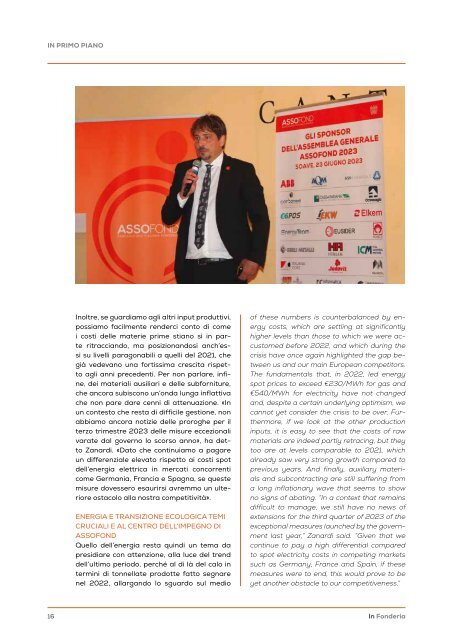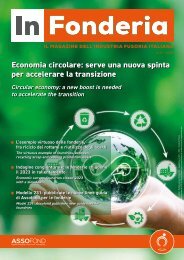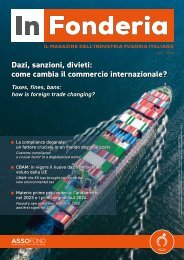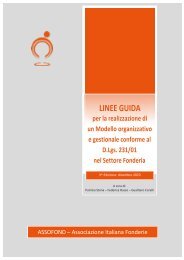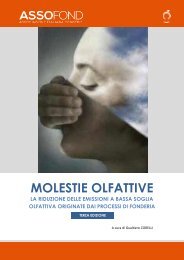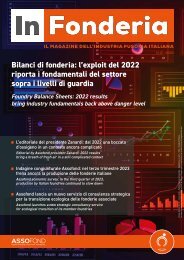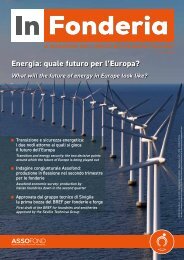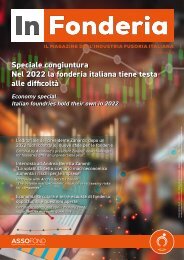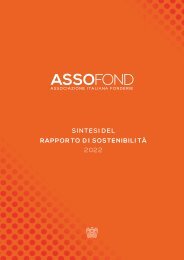In Fonderia 4 2023
Quarto numero del 2023 di In Fonderia
Quarto numero del 2023 di In Fonderia
You also want an ePaper? Increase the reach of your titles
YUMPU automatically turns print PDFs into web optimized ePapers that Google loves.
IN PRIMO PIANO<br />
<strong>In</strong>oltre, se guardiamo agli altri input produttivi,<br />
possiamo facilmente renderci conto di come<br />
i costi delle materie prime stiano sì in parte<br />
ritracciando, ma posizionandosi anch’essi<br />
su livelli paragonabili a quelli del 2021, che<br />
già vedevano una fortissima crescita rispetto<br />
agli anni precedenti. Per non parlare, infine,<br />
dei materiali ausiliari e delle subforniture,<br />
che ancora subiscono un’onda lunga inflattiva<br />
che non pare dare cenni di attenuazione. «<strong>In</strong><br />
un contesto che resta di difficile gestione, non<br />
abbiamo ancora notizie delle proroghe per il<br />
terzo trimestre <strong>2023</strong> delle misure eccezionali<br />
varate dal governo lo scorso anno», ha detto<br />
Zanardi. «Dato che continuiamo a pagare<br />
un differenziale elevato rispetto ai costi spot<br />
dell’energia elettrica in mercati concorrenti<br />
come Germania, Francia e Spagna, se queste<br />
misure dovessero esaurirsi avremmo un ulteriore<br />
ostacolo alla nostra competitività».<br />
ENERGIA E TRANSIZIONE ECOLOGICA TEMI<br />
CRUCIALI E AL CENTRO DELL’IMPEGNO DI<br />
ASSOFOND<br />
Quello dell’energia resta quindi un tema da<br />
presidiare con attenzione, alla luce del trend<br />
dell’ultimo periodo, perché al di là del calo in<br />
termini di tonnellate prodotte fatto segnare<br />
nel 2022, allargando lo sguardo sul medio<br />
of these numbers is counterbalanced by energy<br />
costs, which are settling at significantly<br />
higher levels than those to which we were accustomed<br />
before 2022, and which during the<br />
crisis have once again highlighted the gap between<br />
us and our main European competitors.<br />
The fundamentals that, in 2022, led energy<br />
spot prices to exceed €230/MWh for gas and<br />
€540/MWh for electricity have not changed<br />
and, despite a certain underlying optimism, we<br />
cannot yet consider the crisis to be over. Furthermore,<br />
if we look at the other production<br />
inputs, it is easy to see that the costs of raw<br />
materials are indeed partly retracing, but they<br />
too are at levels comparable to 2021, which<br />
already saw very strong growth compared to<br />
previous years. And finally, auxiliary materials<br />
and subcontracting are still suffering from<br />
a long inflationary wave that seems to show<br />
no signs of abating. “<strong>In</strong> a context that remains<br />
difficult to manage, we still have no news of<br />
extensions for the third quarter of <strong>2023</strong> of the<br />
exceptional measures launched by the government<br />
last year,” Zanardi said. “Given that we<br />
continue to pay a high differential compared<br />
to spot electricity costs in competing markets<br />
such as Germany, France and Spain, if these<br />
measures were to end, this would prove to be<br />
yet another obstacle to our competitiveness.”<br />
16<br />
<strong>In</strong> <strong>Fonderia</strong>


